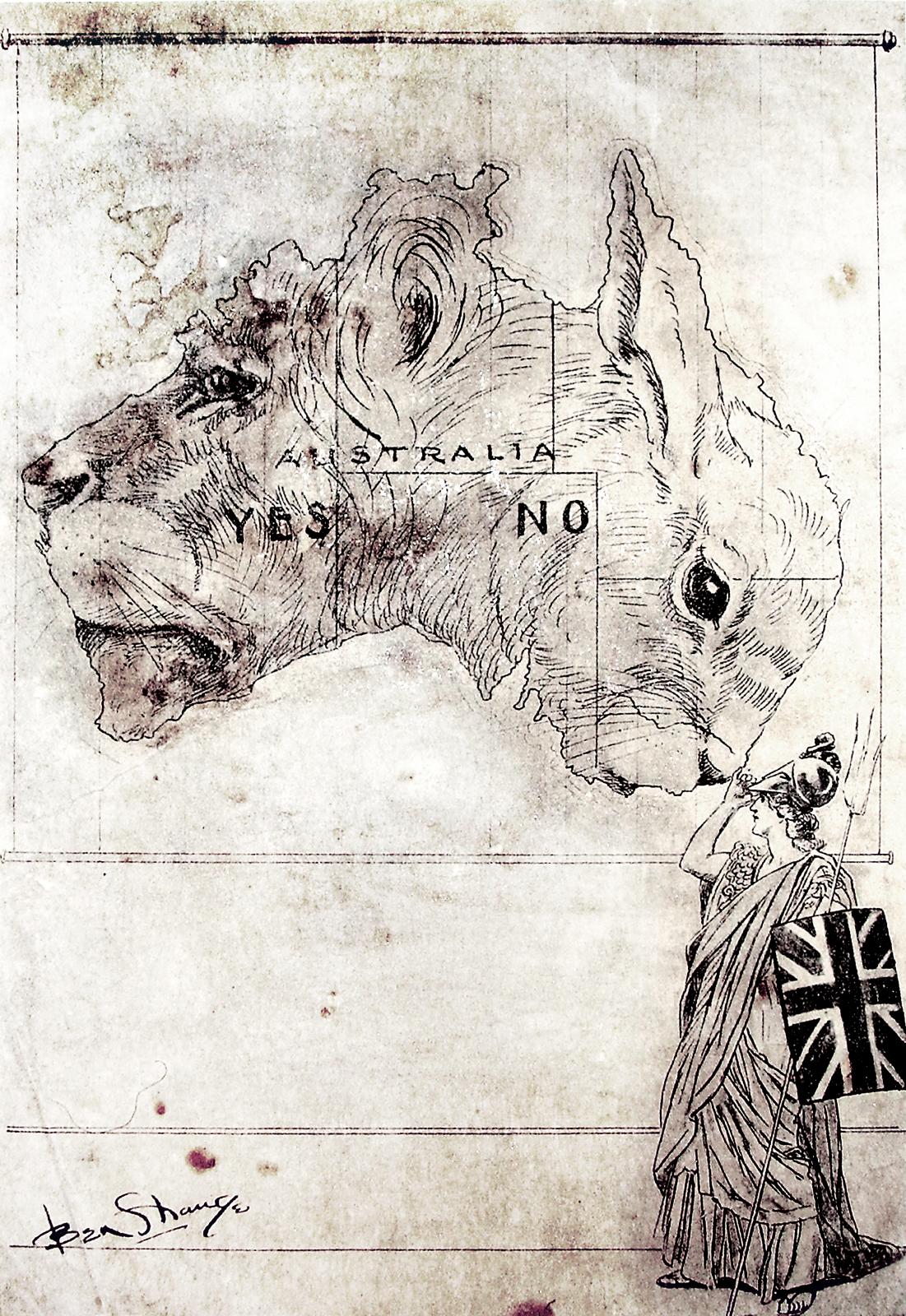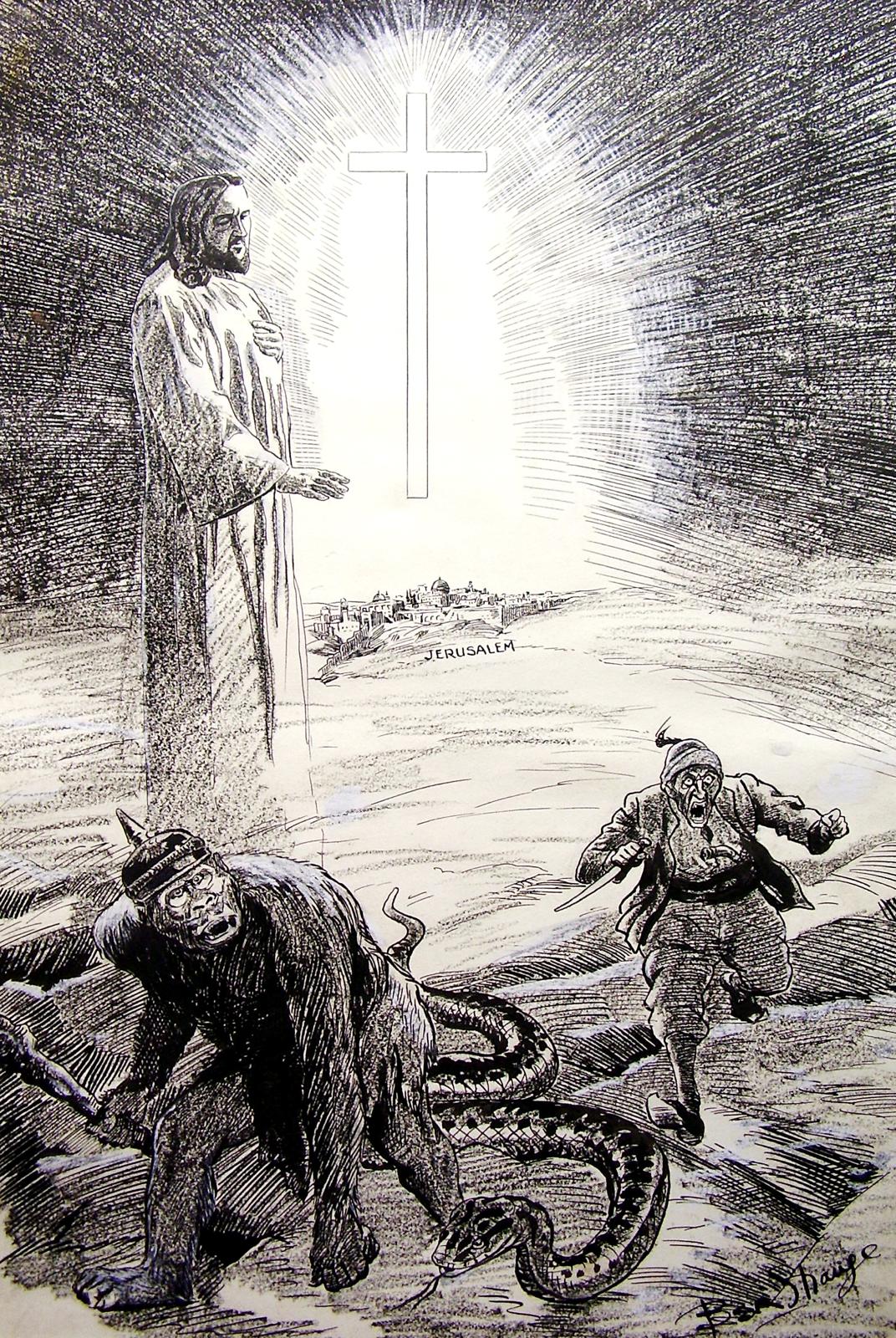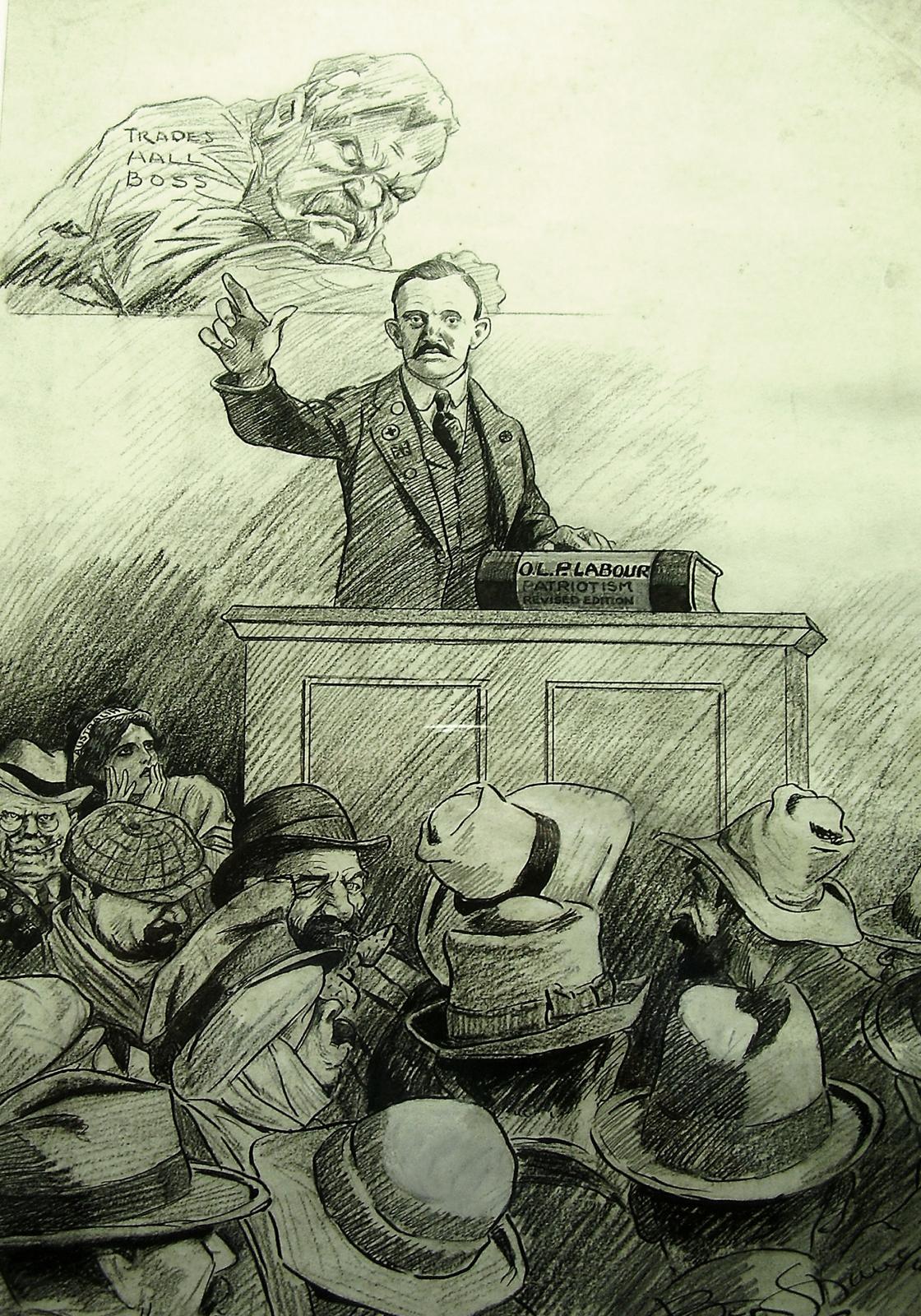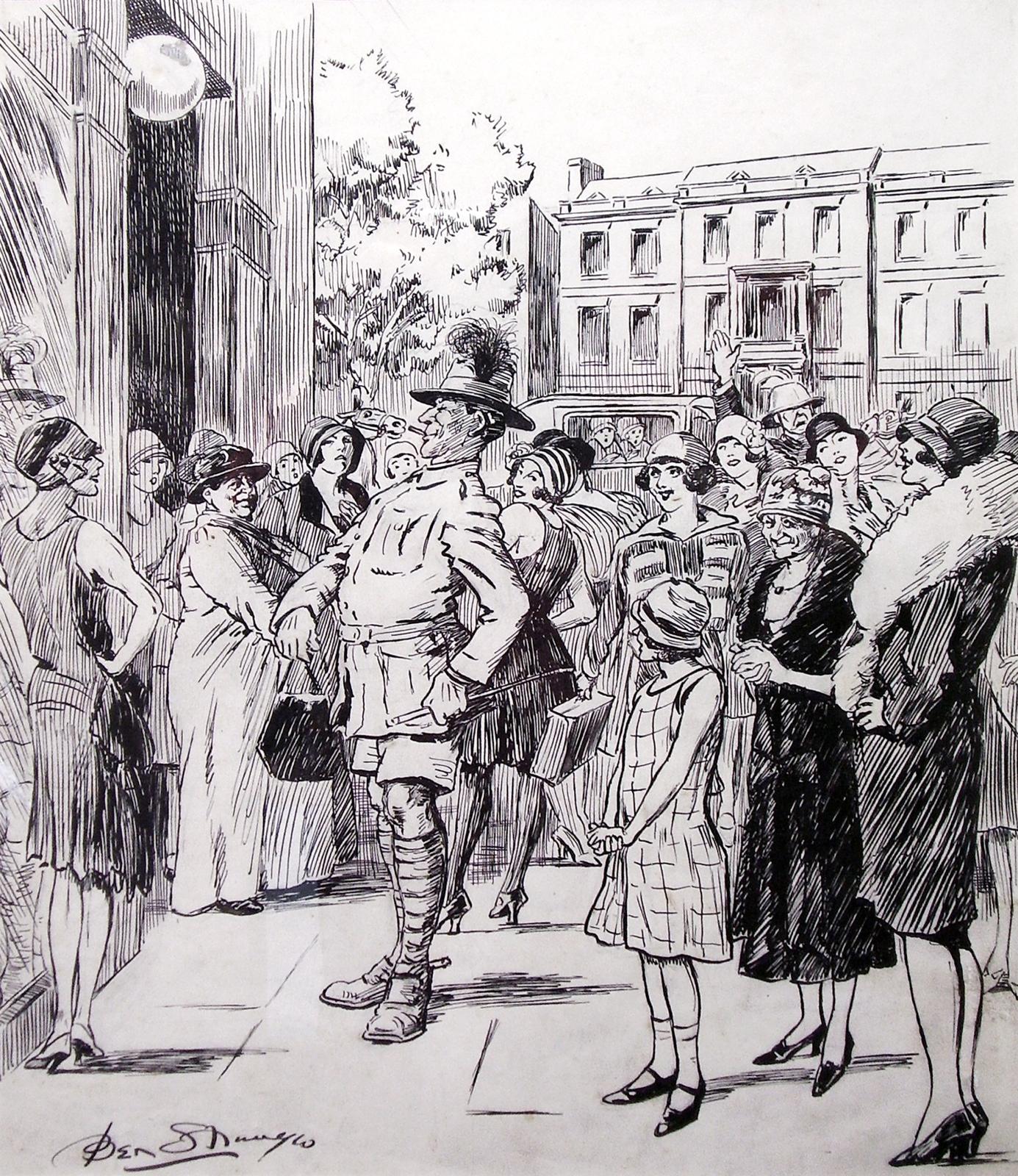The World War One Cartoons of Ben Strange
City of Armadale - History House
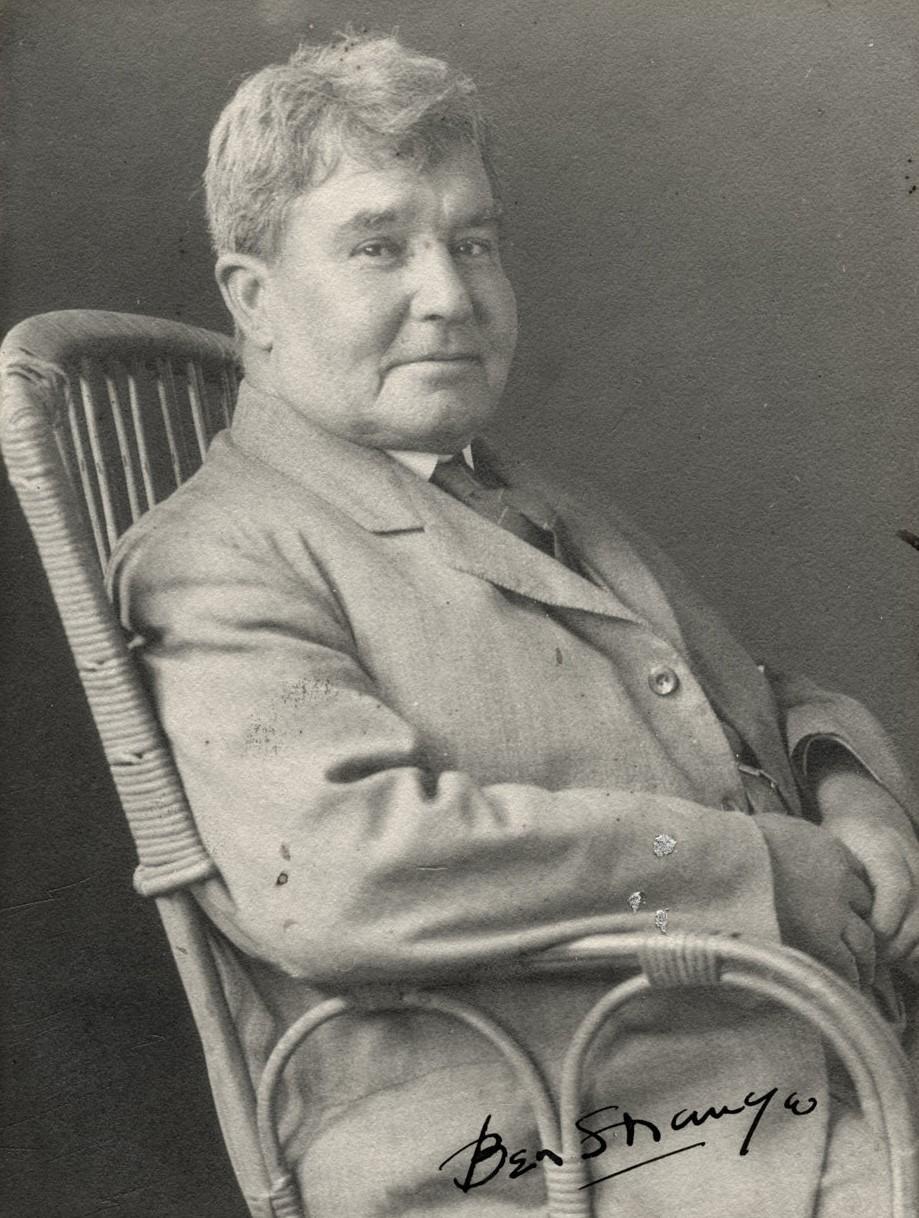
Courtesy Birtwistle Local Studies Library
Who is Ben Strange?
Ben Strange was the cartoonist for the Western Australian weekly newspaper the Western Mail. Ben a self-taught illustrator, had a natural gift for seeing the funny side of life as well as cutting to the heart of an issue. His cartoons were much loved by the readers of the Western Mail and provided an insight into how many Western Australians felt about the war and other local issues during that time.
Ben was born in Ireland at the Cavalry Barracks, Newbridge to Benjamin and Augustine Strange. Ben’s father was a solider with the 10th Hussars and he spent his early childhood travelling between army barracks in Britain before the 10th Hussars were sent to India in 1873. In 1875 the family returned to England and settled in South London.
When at school in London Ben began his love of art recalling that:
“Although very fond of drawing, I’m afraid much of my time was wasted, trying to paint, my efforts good, bad, or indifferent – mostly indifferent, I’m thinking. Beyond the instruction imbibed from school teachers, artistic friends and the small art classes I attended, generally at night-time, my knowledge of art was limited”. Western Mail, 21 August 1930 page 11
In 1885, aged 17, Ben migrated to Perth, Western Australia and was soon hunting for gold in the Eastern Goldfields. During his spare time Ben continued to draw, and the Goldfields Courier commissioned him to draw a weekly page. In 1894 Ben quit mining to become a full-time illustrator for the Coolgardie Miner and the Coolgardie Pioneer. In 1897 Ben moved to Perth and worked for the Clare’s Weekly and the Western Mail.
In early 1900 Ben enlisted in the Second Boer War with Robert’s Horse, a volunteer unit in the British Army. Ben spent eight months in South Africa, sending back letters and sketches about his experiences which were published in the Western Mail.
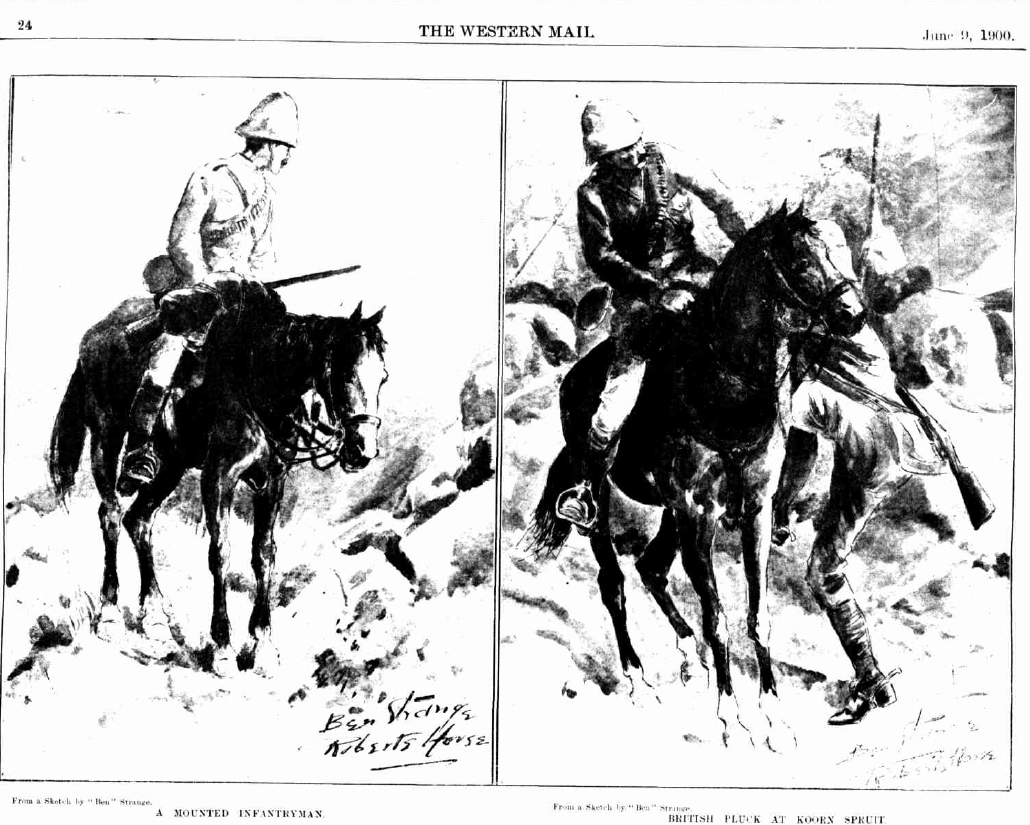
The Western Mail, 9 June 1900, page 24.
Ben returned to Perth and his job at the Western Mail. In October 1902 he was promoted to chief cartoonist and started doing full page political cartoons until 1927. Towards the end of his career Ben again illustrated humorous cartoons for the paper’s Page of Fun with other cartoonists.
Ben died on 16 August 1930 at his home near Canning Bridge. On hearing of his death R.C Spear the editor and owner of the Golden West, an annual journal that Ben regularly contributed to, said:
His merit could be associated with that of Australia’s foremost cartoonists, Livingstone Hopkins (“Hop”) and Alf Vincent, both of ‘The Bulletin’. Had he chosen, he could have gone East or abroad to enlarge his career. He was invited but chose to remain in Perth, the city of his adoption
His obituary in the Western Mail summarised his work as:
'..never gross, and never such as to give needless pain or offence to their subject. Their satire was of the gentler Gilbertian sort. It reflected his own kindly nature, and so it came about among the thousands whom his quaint caricatures excited to laughter were the caricatured themselves.' Western Mail, 21 August 1930, page 11
His good friend Ivor T Birtwistle, who had known Ben since he started at the Western Mail as an office boy before working his way up to editor of the paper, described Ben lovingly as:
'..short and fat and looked like a barrel, and indeed was a barrel because he consumed enormous quantities of beer.' I.T. Birtwistle, ‘Reminiscences of the Early Days of W.A. Newspapers’. Lecture transcript. 1967. Battye Library PR5106.
Ben Strange is buried at the Karrakatta Cemetery, he never married.
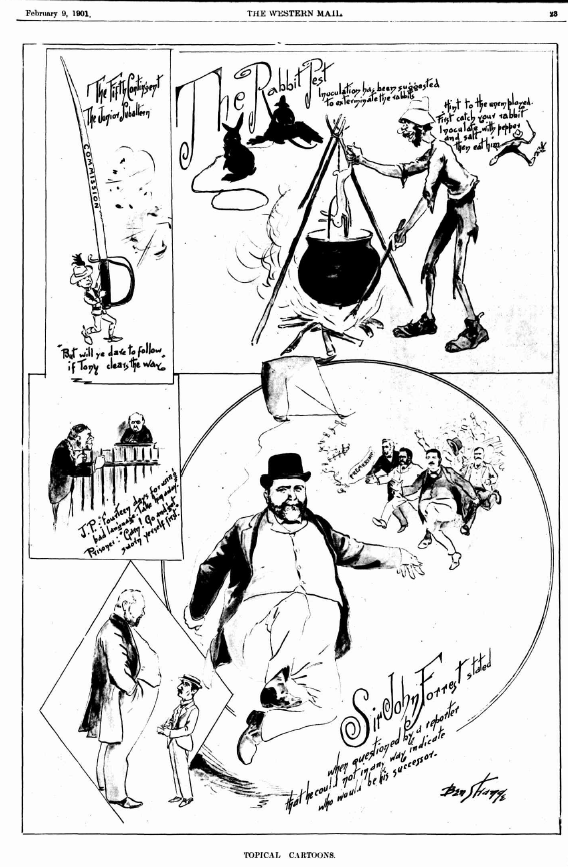
An example of one of Ben's early topical cartoons from The Western Mail, 9 February 1901, p23.
Ben and World War One
Ben was a strong supporter of the Allied forces in World War One and firmly believed that Germany and the Central Alliance started the war. His feelings towards duty and military service most likely evolved from growing up in British Army barracks and his time spent fighting in the Second Boer War (1899-1902).
The Western Mail was a mainstream newspaper and supported the Australian war effort including the call for national conscription in Australia. Ben was a strong support of the 1916 and 1918 referendums on introducing conscription in Australia. Both referendums failed to pass, with only Western Australia and Tasmania voting for conscription both times. It was following the defeat of the second referendum that Strange published one of his most notable cartoons’ East is East and West is West’ which strongly criticises the result.
The Dissenters!
Ben Strange was very critical of anyone who he perceived as showing decent against the war effort, including foreign governments who were staying neutral during the war, ‘slackers’ and any union who through industrial action threatened the war effort.
During the conscription referendum debate many unions campaigned against conscription making them a target for conscription supports like Strange. His strong criticism of unions and his perception that many of their actions and socialist beliefs went against the ‘national interest’ continued throughout his career.
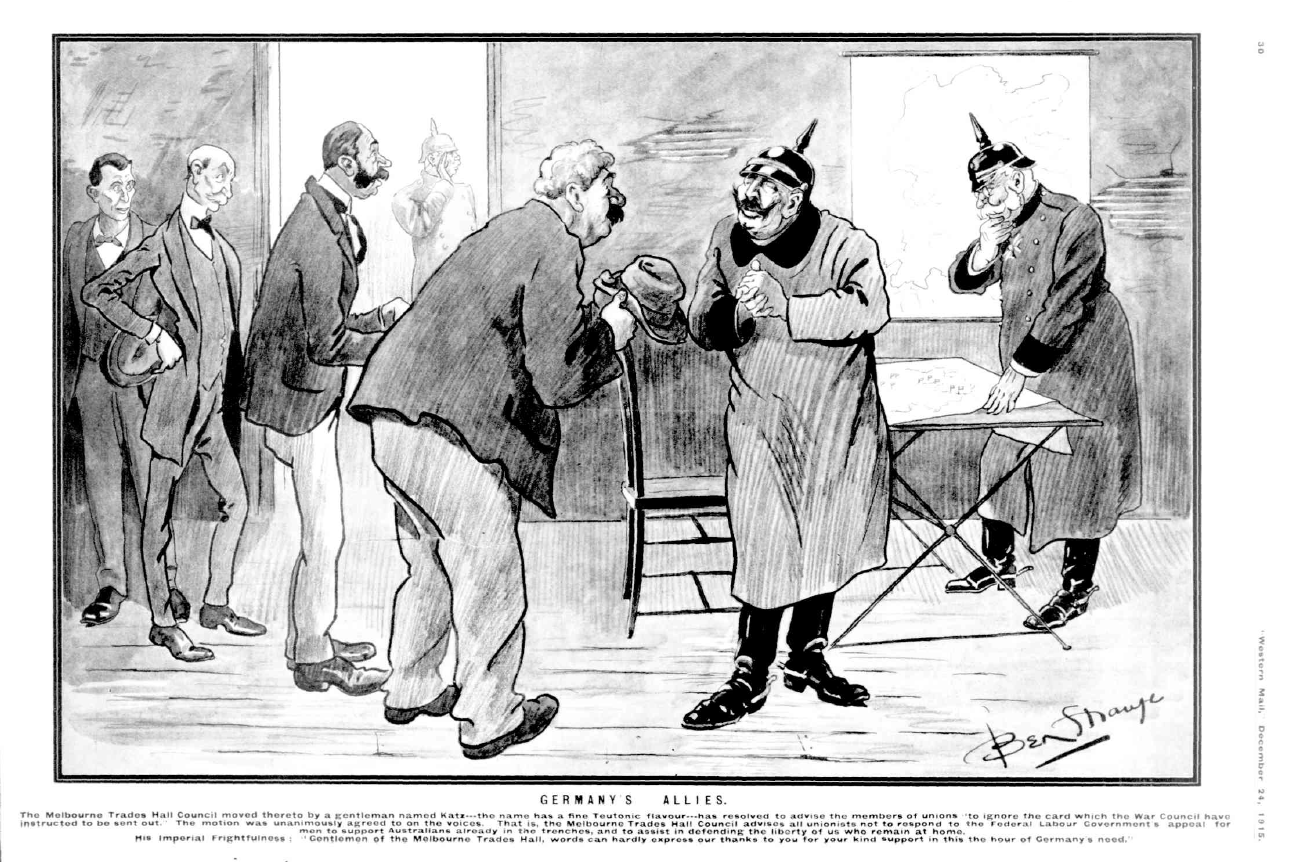
‘German Allies' Western Mail 24 December, 1915, p30.
Ben Strange was always ready to attack unions as being unpatriotic. In this cartoon he is targeting the Melbourne Trades Hall Council for advising its members to ignore the recruitment cards sent out by the Government. Strange summed up his belief with the cation ‘His Imperial Frightfulness: “Gentlemen of the Melbourne Trades Hall, words can hardly express our thanks to you for your kind support in this the hour of Germany’s need.”’
The Kaiser
Though Ben Strange’s cartoons were described as ‘never gross, and never such as to give needless pain or offence to their subject’, when it came to Kaiser Wilhelm II, German Emperor and King of Prussia, he was less gentle. Strange often portrayed the Kaiser as weak, cowardly and often hiding behind his bed sheets. He also liked to draw a pig dressed in a toga, or a vulture wearing a pickelhaube, the tradition spiked helmet of the German army, to represent Germany and its allies
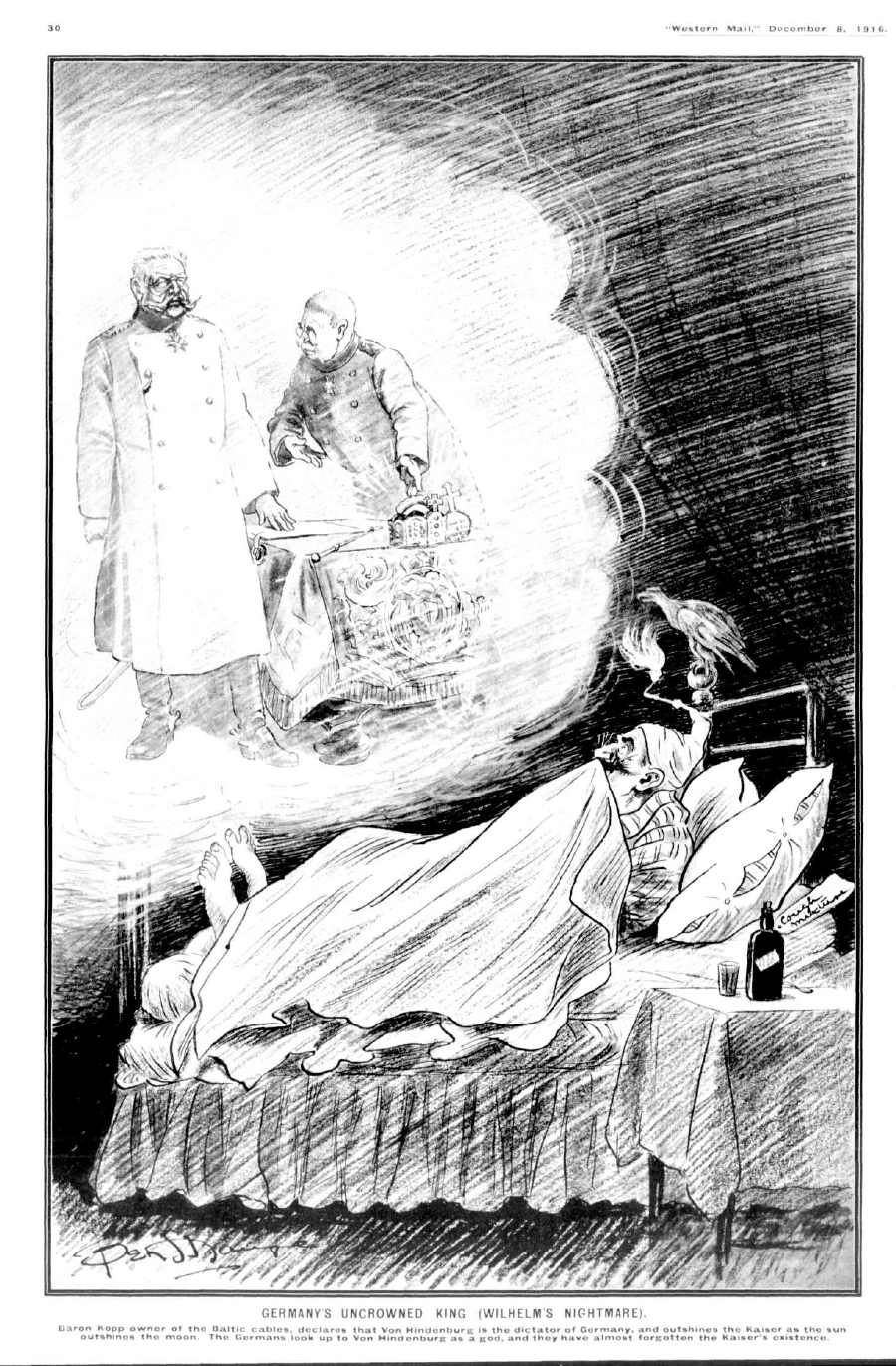
‘Germany’s Uncrowned King’ Western Mail December 8, 1916, p30. Ben Strange having fun showing the Kaiser cowering in bed in fear that his popular chief of the German Army, Paul von Hindenburg, will usurp him as the leader of Germany.
When will they join?
The United States of America was very reluctant to get involved in World War One. President Woodrow Wilson believed that the U.S.A could act as a mediator to bring about peace in Europe. Wilson’s neutrality stance demonstrated by his slogan ‘He kept us out of the war.’ played a significant part in getting him re-elected in 1916.
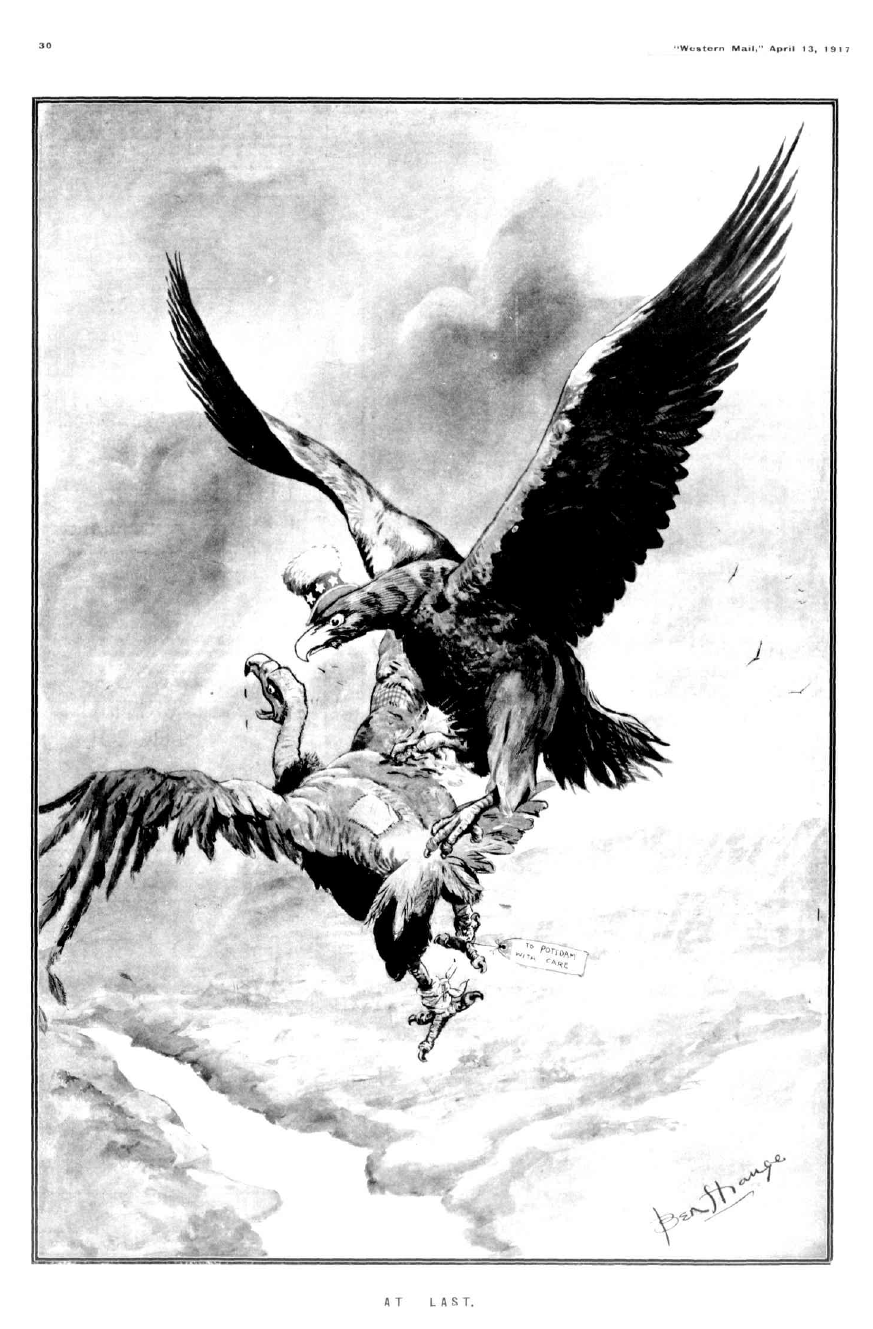
'At Last’ published in the Western Mail April 12, 1917, page 30, six days after the United States of America declares war on Germany.
Life goes on
As war raged in Europe and the Middle East, life continued in Western Australia and domestic issues were still examined by local papers. During the war Ben continued to comment on what the State and Federal Governments were doing as well as local events including the Perth Royal Show.
From the Ashes of War
Though World War One ended on 11 November 1918, it continued to have an impact on events in Europe for years to come. Empires had fallen and new nations created, entire regions had to be rebuilt and the workforce drain caused by war contributed to failed crops and famine in parts of Europe.
New political entities including the League of Nations were formed and the Allied Forces, particularly France, were determined to get their reparations from a defeated Germany. In the political uncertainty following the war smaller nations flexed their muscles and the new political forces of communism in the recently formed USSR and fascism in Spain, Italy and German began to emerge.
Legacy
Ben is one of Western Australia's most important political cartoonists. His 30 plus year career saw him comment on some truly momentous local, national and global events as well as the little things happening around Perth. He left a strong legacy that other political cartoonists have been able to build on. His views represented the general mainstream who enjoyed his take on global and local stories and truly riled those with a different opinion to his though this never stopped him from having a laugh at the expense of the powerful.
To discover more of the Ben Strange cartoons at History House explore Collections WA or to see more of his published works visit Newspapers & Gazettes Home - Trove and search for Ben Strange.
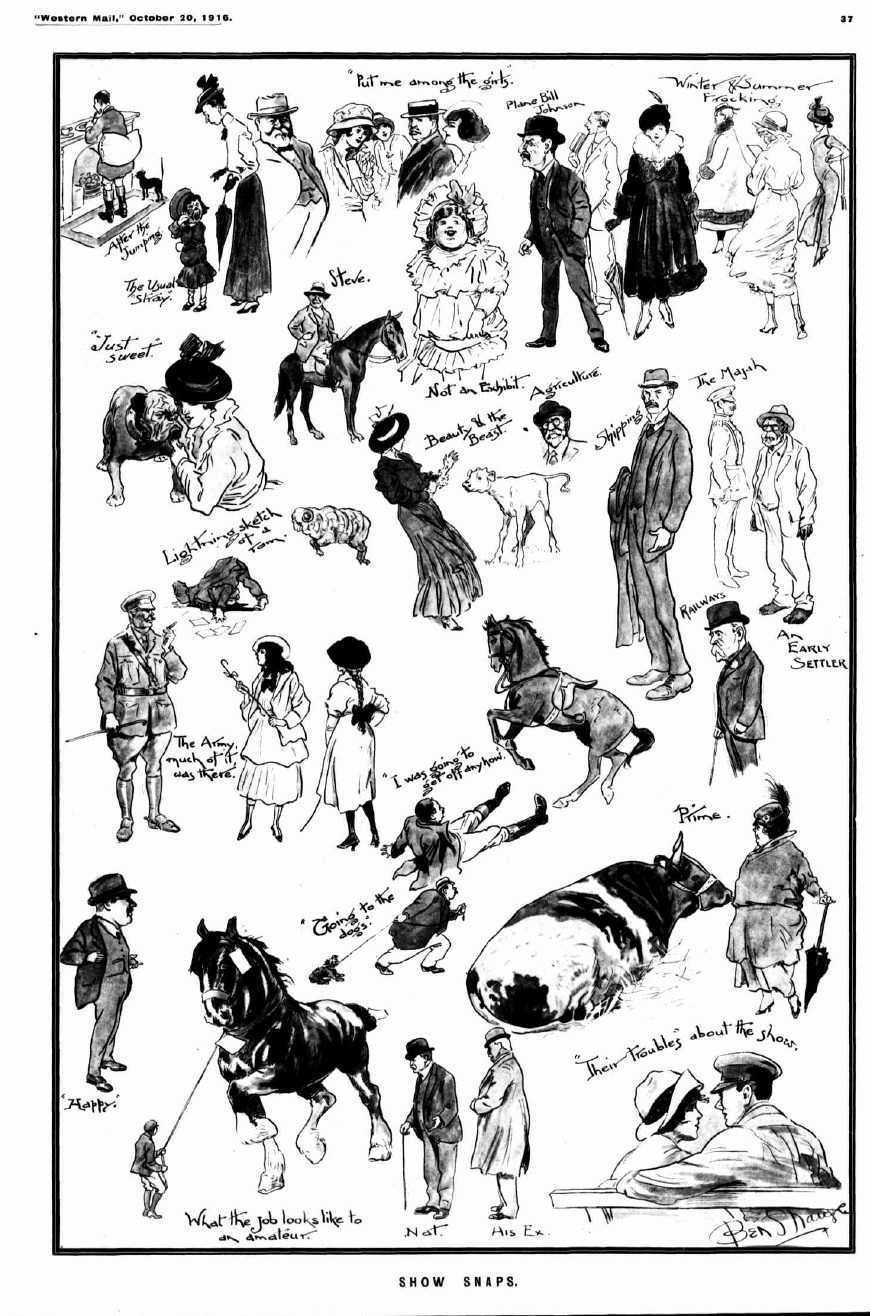
‘Show Snaps’ Western Mail October 20, 1916, page 37. Even when the theme is the Perth Royal Show Ben couldn’t help poking fun at some of the people and events from the show including some possible prominent figures from Western Australia.
Acknowledgement
The City of Armadale and History House Museum would like to thank the following people and organisations for making this exhibition possible.
- The Department of Veterans Affairs for providing funding through the Centenary of ANZAC Local Grant program.
- Henry Zelones AOM, JP
- Andrew Webster, Adjunct Professor Murdoch University
- Dean Alston, West Australian Newspaper
- Professor Jenny Gregory, University of Western Australia
- Matthew Keogh MP
- To the Birtwistle family for donating these works to museum.
- Mrs. Court for donation ‘East is East and West is West’ to the museum
